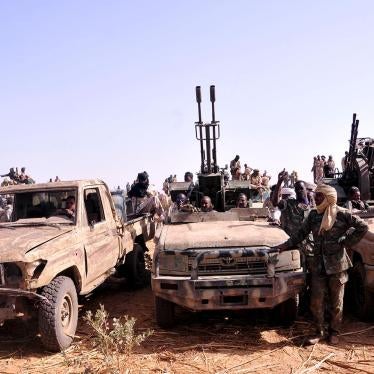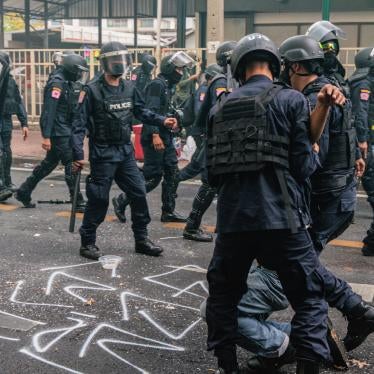(New York) - Human Rights Watch today strongly condemned the latest moves by the Yugoslav authorities to obstruct investigations into alleged war crimes in Kosovo. On Wednesday, October 7, the International Criminal Tribunal for the Former Yugoslavia (ICTY) announced that the Yugoslav authorities had denied visa requests for ICTY investigators to probe recent atrocities. The Yugoslav authorities have stated that they do not recognize the jurisdiction of the Tribunal over war crimes committed in Kosovo.
"It is essential that the perpetrators of war crimes in Kosovo be brought to justice," said Holly Cartner, Executive Director of Human Rights Watch's Europe and Central Asia Division. "President Milosevic wants to hide evidence of atrocities by his troops. He cannot be allowed to dictate the terms of the investigation. Time is of the essence, and the international community must demand that the ICTY is allowed to carry out an immediate, unconditional and unimpeded investigation."
The investigation of war crimes committed in Kosovo is a time-sensitive matter, and delays resulting from obstruction by the Yugoslav authorities jeopardize the possibility of bringing the perpetrators of abuses to justice, the organization said. Evidence deteriorates and may be destroyed, the memory of witnesses fades, and a real possibility of government interference or harassment of witnesses exists. Human Rights Watch urges the ICTY to intensify its efforts to investigate allegatiosn of war crimes in Kosovo in a timely manner.
Since the beginning of the Kosovo conflict, Human Rights Watch has documented and investigated numerous allegations of war crimes committed by Yugoslav forces in Kosovo. These abuses include summary executions of civilians and suspected members of the Kosovo Liberation Army (KLA), torture, the targeting of civilians during military operations, and the wanton and widespread destruction of civilian property and objects essential to the survival of civilian population. There have also been credible allegations of violations of the law of war committed by the KLA, but the government has refused to allow independent investigators and the ICTY to investigate these allegations as well.
The Security Council created the International Criminal Tribunal for the former Yugoslavia in May 1993 to prosecute war crimes committed during the wars in former Yugoslavia beginning in 1991. The Security Council has specified no termination date to the Tribunal's jurisdiction. On March 10, shortly after hostilities broke out in Kosovo, the Chief Prosecutor for the Tribunal, Chief Justice Louise Arbour announced that she considered Kosovo to be within her jurisdiction. She put both sides to the conflict on notice that she would commence an investigation of any violations of international humanitarian law committed there.
The U.N. Security Council has repeatedly affirmed that the ICTY's jurisdiction extends to Kosovo. Most recently, on September 23, the Security Council "call[ed] upon the authorities of the Federal Republic of Yugoslavia, the leaders of the Kosovo Albanian community and all others concerned to cooperate fully with the Prosecutor of the International Tribunal for the Former Yugoslavia in the investigation of possible violations within the jurisdiction of the Tribunal."
The Yugoslav authorities are bound to cooperate with the Tribunal under numerous Security Council resolutions and the Dayton Peace Agreement that resolved the conflict in Bosnia-Hercegovina. Notwithstanding these commitments, the Yugoslav government has consistently ignored the Tribunal's authority and openly harbored a number of publicly indicted war crimes suspects.
Since the outbreak of hostilities in late February, Human Rights Watch has conducted two missions to the region and documented serious violations of humanitarian law falling within the Tribunal's jurisdiction.






